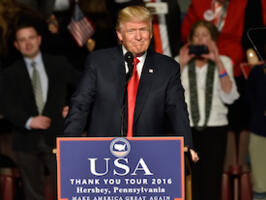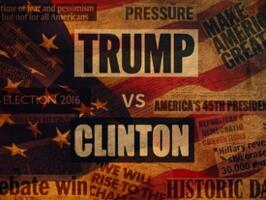GOP Wins, CNBC Loses Last Night’s Debate
A Commentary by Fran Coombs
The latest Republican presidential debate was a textbook example of the media bias voters have complained about in surveys for years.
Seventy-five percent (75%) of Likely U.S. Voters believe that when it comes to covering prospective presidential candidates, the media is more interested in creating controversies about them than it is in reporting where they stand on the issues.
The questions asked by the CNBC reporter-moderators in the early going last night showed exactly why voters feel this way, and Senator Ted Cruz called them on it.
“The questions that have been asked so far in this debate illustrate why the American people don’t trust the media,” Cruz said with enthusiastic audience support. “This is not a cage match. And you look at the questions — ‘Donald Trump, are you a comic-book villain?’ ‘Ben Carson, can you do math?’ ‘John Kasich, will you insult two people over here?’ ‘Marco Rubio, why don’t you resign?’ ‘Jeb Bush, why have your numbers fallen?’ How about talking about the substantive issues the people care about?”
Cruz went on to contrast those questions with the fawning media treatment the Democratic presidential candidates received at their first debate on CNN two weeks earlier. In the two-hour Democratic debate, the word “Benghazi” was never mentioned, and Hillary Clinton’s e-mail problems, currently the subject of an FBI investigation, were only briefly mentioned and then brushed aside.
Yet most voters question Clinton’s honesty on the Benghazi and e-mail issues and believe she is out of the mainstream in areas like illegal immigration.
But in a survey earlier this year, 55% of Republicans said they expect most reporters to try to help Clinton’s campaign.
(Want a free daily e-mail update? If it's in the news, it's in our polls). Rasmussen Reports updates are also available on Twitter or Facebook.
Fifty-two percent (52%) of all voters said just before Election Day in 2012 that the journalists who are debate moderators show bias in their questioning. Just 30% disagreed.
Other candidates made critical comments about the questions last night, but Cruz’s reaction was the real moment when the debate shifted. From that point on, the moderators, whether they wanted to or not, kept the focus of the debate largely on the issues – from illegal immigration to tax policy to how to keep Medicare and Social Security solvent.
The candidates were so intent on keeping the debate on the issues, in fact, that New Jersey Governor Chris Christie jumped in at one point to criticize a question on a lighter topic, fantasy football.
“Are we really talking about getting government involved in fantasy football?” Christie asked. “We have $19 trillion in debt. We have people out of work. We have ISIS and al-Qaeda attacking us. And we’re talking about fantasy football? Can we stop? How about this? How about we get the government to do what they’re supposed to be doing, secure our borders, protect our people and support American values and American families. Enough on fantasy football. Let people play, who cares?”
No wonder during the last presidential election cycle that just 36% of voters felt that debate moderators ask mostly about important issues.
Media bias is a long-standing concern of voters, and only 23% expect reporters to offer unbiased coverage of the 2016 presidential race. They expressed similar concerns about newspapers and TV news over 10 years ago.
Seventy-one percent (71%) believe that when covering a political campaign, most reporters try to help the candidate they want to win. In the last two presidential cycles, voters think the candidate they favored was Barack Obama over his Republican opponents.
Sixty percent (60%) of Americans still regard the news reported by the media as at least somewhat trustworthy, but that includes just seven percent (7%) who think it is Very Trustworthy. Only 28% think most reporters share the same political viewpoints they do.
Media soul-searching is unlikely after CNBC’s questionable performance, but for an industry in radical transition, these kinds of numbers aren’t reassuring.
Going into last night’s debate, more Republicans than ever said Donald Trump is likely to be their party’s presidential nominee next year. Rasmussen Reports will release new numbers on Friday that should indicate if the debate made any major difference in the race.
Fran Coombs is the managing editor of Rasmussen Reports.
See Other Political Commentaries .
See Other Commentaries by Fran Coombs .
Views expressed in this column are those of the author, not those of Rasmussen Reports. Comments about this content should be directed to the author at fran.coombs@rasmussenreports.com
Rasmussen Reports is a media company specializing in the collection, publication and distribution of public opinion information.
We conduct public opinion polls on a variety of topics to inform our audience on events in the news and other topics of interest. To ensure editorial control and independence, we pay for the polls ourselves and generate revenue through the sale of subscriptions, sponsorships, and advertising. Nightly polling on politics, business and lifestyle topics provides the content to update the Rasmussen Reports web site many times each day. If it's in the news, it's in our polls. Additionally, the data drives a daily update newsletter and various media outlets across the country.
Some information, including the Rasmussen Reports daily Presidential Tracking Poll and commentaries are available for free to the general public. Subscriptions are available for $4.95 a month or 34.95 a year that provide subscribers with exclusive access to more than 20 stories per week on upcoming elections, consumer confidence, and issues that affect us all. For those who are really into the numbers, Platinum Members can review demographic crosstabs and a full history of our data.
To learn more about our methodology, click here.



